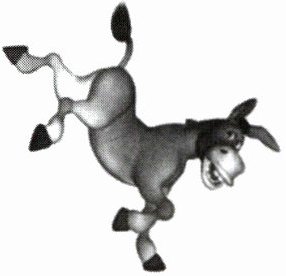B
A man had a little dog, and he liked it a lot. He would pat its head, put it on his knee and talk to
it. Then he would give it some food from his own plate.

A donkey looked in through the window and saw the man and the dog.
“Why doesn’t he choose me as his pet?” said the donkey. “It is not fair. I work hard, and the dog only wags(摆动) its tail, barks and jumps onto the master’s knee. It is not fair. ”
Then the donkey said to itself, “If I do what the dog does, the master may choose me as
his pet. ”
So the donkey ran into the room. It brayed at the top of its voice. It shook its tail so hard
that it knocked over a jar on the table. Then it tried to jump onto the master’s knee.
The master thought the donkey was
mani
acal, and he shouted, “Help! Help!”
Some men came running in with sticks in their hands and they beat the donkey until it
ran out of the house.
“I only did what the dog did,” said the donkey, “and yet they still treat the dog as their
pet and they beat me with sticks. It is not fair. ”
(
D
)4. Why did the donkey do what the dog did?
A. Because it wanted to turn into a dog.
B. Because it wanted to make its master angry.
C. Because it wanted its master to give it food.
D. Because it wanted its master to choose it as a pet.
(
B
)5. What does the underlined word “maniacal” in Paragraph 6 mean in Chinese?
A. excited B. crazy C. tired D. bored
(
C
)6. What did the master do when the donkey tried to jump onto his knee?
A. He ran into the room. B. He patted the donkey’s head.
C. He called for help. D. He put the donkey on his knee.
(
A
)7. What does the passage want to tell us?
A. Everyone has his/her value(价值). B. People treat animals differently.
C. Dogs are cleverer than donkeys. D. Everyone can change if he/she tries hard.